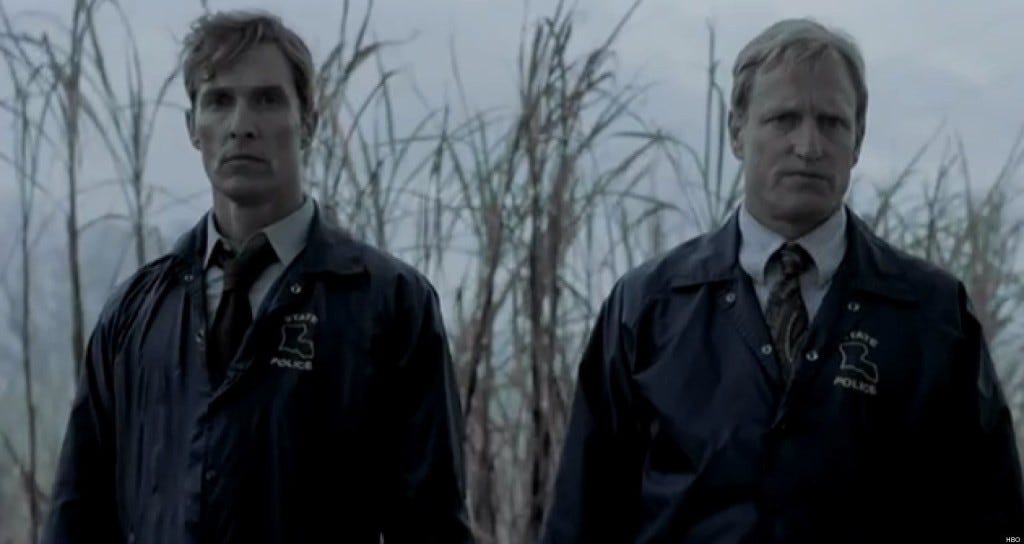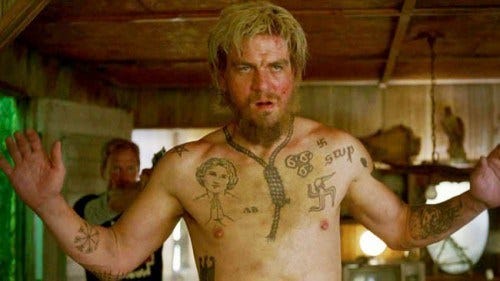Come on inside, little priest. To the right, little priest. Take the bride's path.
Last night I finished watching Season One of True Detective for the third time. The first season of True Detective is some of the best television ever created, truly elevating the artform. It's one of several shows, and my personal favorite, that approaches the depth of a good novel. Beyond the cinematography, soundtrack, and excellent acting by Matthew McConaughey, Woody Harrelson, and Michelle Monaghan, the last giving a fantastic understated performance, the show kills it with a fantastic script that blends mystery, occult, Southern Gothic, police procedural, and nihilistic cosmic horror.
The complex Occult elements of the show along with the sub-textual Twilight Language are covered in depth by Jay Dyer's True Detective analysis, which I find convincing. I also recommend his Esoteric Hollywood books on occultism and film. The philosophical outlook of Rust Cohle prior to his final spiritual awakening, pessimistic anti-natalism, is primarily taken from Thomas Ligotti's book, A Conspiracy Against the Human Race, a book and outlook I will address in greater depth in a future post. What I want to talk about it, and one of my favorite things about the show is it's portrayal of evil.
True Detective Season One stands out in how it portrays the corruptive insidious nature of evil. Evil isn't just actions taken by individuals but a disease, a miasma that poisons the root of society itself and takes on an intergenerational hereditary nature. The portrayal of evil in True Detective is the best example of the Christian Augustinian conception of evil.
Saint Augustine of Hippo, one of Christianity and the West's greatest philosophical thinkers on the conceptualization of evil fundamentally looks at sin and evil in two ways. His first concept is that evil and sin is privational, that evil is nothing. God made creation, God is good, creation is good, therefore evil is nihilation of the good. Evil is nothing more than privation of a good reality, the evil of an act is how it lessens the good of the universe.
The second Augustinian concept of evil is perversion. If evil is nothing than people are perverted towards wanting nothing; they are turned away from wanting the good and instead focus their wants towards things that are empty and meaningless. This element is mixed with the idea of corruption, illustrated in the concept that even a harmless lie hurts both the teller and the one being lied to. For example, the one on the receiving end of a lie, once made aware will lose faith in the future of truth from fellow man. In the same vain, the teller of the lie knows that others can be convinced by lies and becomes less trust worthy and suspicious. A small lie thus has a corruptive and perverse effect on society that goes far beyond the actual action itself.
The above conceptualizations of evil are illustrated throughout True Detective. The privational view is mirrored in Rust Cohle's pessimistic philosophy which is a direct exposition of the evil outlook of the Tuttle Family death cult. Nihilistic symbolism of negation, blackness, death, is seen over and over not only in the spiral cosmic symbolism but verbalized by the dark priests of the cult, Reggie and Errol. Blackness, nothingness, and eternal return to a meaningless existence. The negation of good and God, the most terrifying evil. An evil that is recognized and opposed by Rust himself by the very fact that he continues with the case in direct opposition to his stated nihilistic philosophy.
But the portrayal I find the most compelling is how well True Detective shows us the pervasive corruptive aspect of evil. So much popular media portrays anti-heroes and evil in maybe not outright positive light but often as exciting and darkly sexy. The cult in Kubrick's Eyes Wide Shut or the party girls in Beneath the Silver Lake. True Detective shows evil in it's banal degenerative state. While the Tuttle's might have power and riches the evil oozes from them across generations and the very land itself. Behind the plastic smile of Reverend Tuttle lies the inbred monstrosity Errol Childress and his half sister.
This place is like somebody's memory of a town, and the memory is fading. It's like there was never anything here but jungle
The corruption is everywhere, even in the land itself, taken root and symbolized by the imagery of the Tree and the spiral wild brambles that the characters come across whenever getting near one of the family. Evil permeates both the physical and the spiritual, Cohle can taste the "aluminum and ash" of the psychosphere.
The evil is generational and goes beyond the initial molestations, rapes, and murders. It destroys families and communities, negating the future, negating the good. This is clearly shown through the degeneration of the community between 1995 and 2012, symbolically in the Fontenau family with the cerebral palsy, the pealing paint, the catatonic state of the victims, and the regression into prostitution and vice.
My favorite example, and where I think the show reached the highest level is the portrayal of degenerative evil on Marty Heart and his family. His willful blindness towards sin, his turning away from "what he should want" his wife and daughters, towards the "wasteful and meaningless," represented by the "crazy pussy" he keeps chasing. His degeneration destroyed his family, indirectly led his wife to use Cohle, and can be argued led to the promiscuity and illness of his daughter. The narrative highlight is that the sexual encounter that led to his marriage ending was with the former prostitute he helped out in 1995, a good impulse, a good act, corrupted.
True Detective for its acting, plot, and complex occult and spiritual meta-narrative is one of my favorite shows. I highly recommend it to anyone that shares my taste in literature and film.




